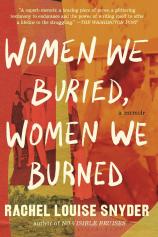Women We Buried, Women We Burned: A Memoir
Review
Women We Buried, Women We Burned: A Memoir
Rachel Louise Snyder’s memoir, WOMEN WE BURIED, WOMEN WE BURNED, opens with a harrowing scene. Eight-year-old Rachel and her older brother, David, return from school to find an ambulance parked in front of their house. This, in and of itself, is not a remarkable occurrence; their mother, Gail, has been ill for nearly as long as Rachel can remember. This time, however, the ambulance is parked outside. Inside, Rachel’s mother --- accompanied by Rachel’s grandmother and aunt --- struggles to breathe, eventually drawing her last desperate breath as her daughter looks on.
"WOMEN WE BURIED, WOMEN WE BURNED can be read on several different levels and likely will land differently with every reader. As a result, it will lead to rereadings and rich discussions."
This is traumatic in several ways, but it also sets the stage for everything that follows in Rachel’s account of growing up without her mother, growing apart from her father, and trying to reclaim what it means to be a daughter and a mother. As Rachel recounts, her father, a Christian, swore that Gail called on Jesus during her final moments, even though he wasn’t even there to witness her death. This rewriting of history accomplishes several things: it robs Gail of her Jewish identity, it calls into question Rachel’s own eyewitness recollections of that day, and it centers her father’s perspective on the whole incident. In short, it erases essential facets of both Rachel and her mother from the scene.
This erasure is recapitulated throughout Rachel’s childhood and adolescence. Remarrying quickly, her father embraces evangelical Christianity, refusing to acknowledge his children’s Jewish heritage or even talk about his late wife. His version of Christianity goes hand-in-hand with patriarchal authority and harsh, borderline abusive discipline. It results in Rachel, David and their two older step-siblings getting kicked out of the family home as teenagers.
Rachel describes her adolescence as a series of failures and near-disasters, precipitated in many cases by a lack of adult guidance and her own lingering anger. It’s only when she gains experience managing a friend’s band --- a fun job that leads her in a roundabout way to college --- that she starts to glimpse a different path for herself, one that eventually leads around the world before returning her back to her family.
Rachel tells her story straightforwardly, with a minimum of blame and self-pity. Her background as a journalist shines through as she describes her experiences honestly but without added drama or artifice, instead letting the people and events speak for themselves. This results in a narrative whose style belies its depth, for even as Rachel recounts her own maturation as a woman and a writer, she’s also commenting obliquely on how trauma is recapitulated and the countless ways in which male authority warps and erases women’s stories and lived realities. How she undertakes this work is subtle, even crafty.
WOMEN WE BURIED, WOMEN WE BURNED can be read on several different levels and likely will land differently with every reader. As a result, it will lead to rereadings and rich discussions.
Reviewed by Norah Piehl on May 26, 2023
Women We Buried, Women We Burned: A Memoir
- Publication Date: July 16, 2024
- Genres: Memoir, Nonfiction
- Paperback: 272 pages
- Publisher: Bloomsbury Publishing
- ISBN-10: 1639734074
- ISBN-13: 9781639734078




